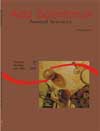<b>Effect of autoclave and/or tannic acid treatments in <em>in situ</em> degradability and <em>in vitro</em> digestibility of canola grains</b> - DOI: 10.4025/actascianimsci.v26i4.1735
Abstract
An experiment was accomplished using canola grains to evaluate in situ degradability and in vitro digestibility. The treatments was: 1) canola grains treated with water (control - CTH); 2) in autoclave at 127ºC for 30min (CTA), 3) with tannic acid (CTT) and, 4) with tannic acid followed by autoclave (CTTA). The effect of these treatments in effective dry matter (EDDM) and crude protein (ECPD) degradability was evaluated by the nylon bag technique, using two Holstein cows with rumen cannula. The effect in in vitro dry matter (IVDDM) and crude protein (IVCPD) digestibility was evaluated by DAISY system of ANKOM® Technology Corporation. The treatments heat and tannic acid applied to the canola grains increased significantly (P<0.05) the solubility of DM "a" fraction. EDDM of treatments CTA and CTTA were higher than CTH and CTT. IVDDM was identical in all treatments. The soluble “a” fraction of CP was significantly (P<0.05) reduced due to CTA treatment, and mostly to due to happened interaction of the heat and of the tannic acid tânico. The CTTA treatment was the only one that reduced ECPD (76.7%) in relation to CTH, CTA and CTT, that showed 84.7; 84.3 and 84.2%, respectively. All the treatments provided an increase in IVCPD when compared to the control (P<0.01). It is concluded that CTTA was the most suitable treatment to obtain lower ruminal degradability of canola grains, without changes in IVDDM and with a rise in IVCPD.Downloads
Download data is not yet available.
Published
2008-04-08
How to Cite
Santos, G. T. dos, Damasceno, J. C., Jobim, C. C., Gonçalves, G. D., Chiquitelli Neto, M., Porto, P. P., & Ribeiro, C. R. (2008). <b>Effect of autoclave and/or tannic acid treatments in <em>in situ</em> degradability and <em>in vitro</em> digestibility of canola grains</b> - DOI: 10.4025/actascianimsci.v26i4.1735. Acta Scientiarum. Animal Sciences, 26(4), 507-512. https://doi.org/10.4025/actascianimsci.v26i4.1735
Issue
Section
Animal Science
DECLARATION OF ORIGINALITY AND COPYRIGHTS
- I Declare that current article is original and has not been submitted for publication, in part or in whole, to any other national or international journal.
The copyrights belong exclusively to the authors. Published content is licensed under Creative Commons Attribution 4.0 (CC BY 4.0) guidelines, which allows sharing (copy and distribution of the material in any medium or format) and adaptation (remix, transform, and build upon the material) for any purpose, even commercially, under the terms of attribution.
Read this link for further information on how to use CC BY 4.0 properly.
0.9
2019CiteScore
29th percentile
Powered by 








































